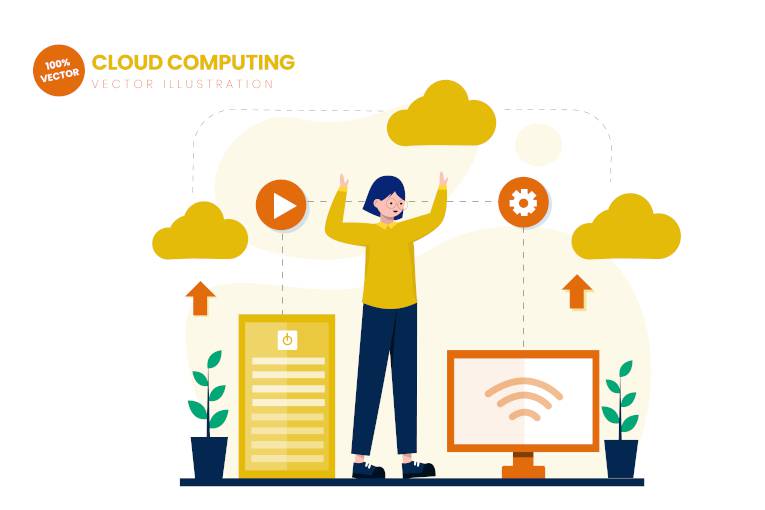In a world where there is increased reliance on technology, you may become more familiar with cyber security and cloud security. What are they and what are the key differences? We’ll break down them down and explore why these security measures benefit businesses.
What is Cyber Security?
Cyber security involves the protection of internet connected devices such as computers, mobiles, and tablets, as well as servers, networks and other data storage. These are all at risk during their use of becoming victim to cyber-attacks, causing potential data leaks and other issues. The elements that make up cyber security include:
- Application security measures
- Network security
- Operational security
- Information security
- Disaster recovery planning
- End user security
Cyber security is essential for businesses and organisations, to prevent any unauthorised access to devices. As well as this, cyber security is paramount in preventing attacks that would prevent the operations of working device/system.
As cyber security and cloud security threats become increasingly common, the industry grows more so with it. That’s why a rapidly inclining number of companies are employing this type of security, to protect their sensitive data and other private files.

What is Cloud Computing Security?
On the other hand, cloud security is more of a collection of policies, procedures and technologies which protect cloud computing environments or systems that are cloud based. Some of these include cloud data, apps, networks and infrastructure.
Cloud data security prevents unauthorised servers from accessing data stored in the cloud. Reducing cloud security risks requires the organisation, as well as the service provider as cloud services acquired through a third party.
Both local and remote cloud computing systems will have access to company data, allowing for easy file access if you have a hybrid working model or working from home. Cloud security categories include:
- Data security
- Data retention and business continuity planning
- Identity and access management, otherwise known as IAM
- Legal compliance cloud security
- Governance
What does cloud security help to protect?
Cloud security helps protect a wide aspect of your business, in fact almost everything that is related to your online work. This could be anything from a devices operating system, hard drives, data servers, cables/routers, application and emails.
How are they different?
We’ve established that cloud security and cyber security measures are essential for businesses, but let’s take a further look at their differences:
Responsibility
With cyber security, the owner of a device is accountable for the safety of personal information. The responsibility is on you to monitor your devices and accounts to best prevent malicious activity, prompting the use of other services to help.
With cloud security, the responsibility lies more with the cloud provider. That being said, the actual use of the services falls under the users’ responsibility. There are some exceptions to this however, for example if you choose to use an easy to guess password that leave your accounts open to hacking, it is your fault.

Data storage/backup
With cyber security, it is easier to keep track of who has access to your information, as data is stored physically. However, as there is more data that needs to be stored, you will need to upgrade its capacity, which can be very costly. Frequent backups and enough storage are required to keep this data protected.
With the cloud, data is stored in the cloud, which is automated and allows you to access data across multiple devices connected to the cloud. The process is not performed by an IT worker and is instead an automated process run by a vendor. Cloud storage and backup is much more cost efficient than traditional methods of data storage. A major advantage of cloud is that you don’t risk any damage to drives, causing potentially catastrophic data loss.
Threat detection
Cyber security uses classic methods such as anti-virus tools to detect security threats. One of the biggest issues with this is that they require regular updates to keep on top of all the latest hacking methods. This is also not fully reliable and still leaves room for cyber-attacks.
Cloud computing security risks are also on the rise. However, cloud security automatically picks up on these security threats as a result of artificial intelligence (AI). This doesn’t require updating like cyber security does, as it’s always keeping up to date on the latest security threats and hacks, keeping your data safer.
Liability
Cyber security is necessary to protect devices from malware that’s trying to steal sensitive data. The liability therefore will be on the user.
The cloud service provider is liable as it is their responsibility to keep users’ personal information secure. This can offer some reassurance as a trusted cyber security provider has all the tools and years of experience to protect you.
Popularity
Cyber security has got less and less popular throughout the years as people are moving more towards the cloud. However, some users still choose to employ a combination of cloud security and cyber security so that they can increase their levels of protection, avoiding unwanted data breaches.
Since the pandemic, companies are increasingly able to efficiently adopt a hybrid work model and some even becoming fully remote, causing cloud security to surge in popularity. 92% of businesses use cloud services today and that number is only going to increase.
Find the right Cloud Service Solution for Your Business with Freestyle TS
Freestyle TS specialise in delivering cloud technology packages & cyber security to businesses of all sizes, bringing you a range of cloud-based services. Some of these include cloud servers, data centres with enhanced data security, and an overall excellent cloud environment. Contact us today and we can help you find the right cloud solution for your business’s needs.



